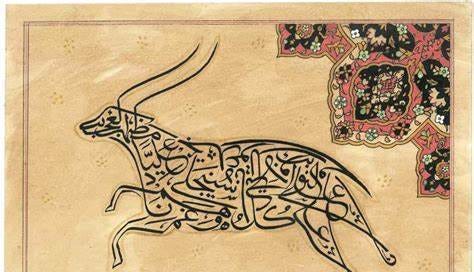🌟 Dwellers of Paradise [2]: Nostlagia, Wanderlust & Provision in the Couplet of Al-Ashaa:
Ibn Qarih Roams the Paradisal Desert in His Luxurious Ride & Reflects with a Verse of Al A'shaa
✨ The Story Continues:
Mounts Ibn Qarih a celestial camel made of rubies & pearls, in a balmy air untouched by both heat and cold. Riding carelessly through Paradise carrying ever-lasting provisions. & In between perfumed hills he raised his voice with the following verses of Al - A’shaa1, :
Layta shiʿrī matā takhubbu binā an-nāa — || Qatu Bayna al-ʿUdhaybi faṣ-Ṣaybūni
I wish I knew my camel will ever trot with us
toward al-ʿUdhayb and al-Ṣaybūn,
Muḥqiban zukratan wa khubza ruqāqin || Wa ḥibāqan wa qiṭʿatan min nūnin
With behind her saddle: a skin of wine,
some paper-thin bread, basil fresh, and a fillet of fish.
[Lets learn some Arabic using this couplet!]
🟢 Understanding The Arabic Words in Context:
ليت شِعري – “Would that I knew!” An idiomatic phrase showing deep longing and wistful questioning.
متى تخب بنا الناقة – When will the she-camel trot along with us…”
=> تخب = to trot lightly, used poetically for leisurely yet determined movement.
بين العذيب فالصيبون – Between al-ʿUdhayb2 and al-Ṣaybūn3, names of landmarks/travel stations on old caravan routes.
محقبًا – With saddle-bags loaded (lit. strapping behind the saddle), indicating provisions for the journey.
زكرةً – A wine-skin, often used for fermented date wine (nabīdh) or grape wine in early Arabic texts.
خبز رُقاقٍ – Thin bread, likely unleavened and baked on hot stones, still common in Bedouin culture.
حباقًا – Sweet basil, fresh aromatic herb often used with food or for its smell.
قطعةً من نون – A slice of fish, ‘nūn’ here being a classical euphemism for fish — particularly salted or preserved.
🔵 Intricacies of the Verse:
This couplet is an example of safaru-qasīda or "travel verse", where longing for journey is infused with hedonistic provisions. Unlike war-focused or prideful verses, this tone reflects tender wanderlust and delicate pleasure which is amongst the hallmarks of al-Aʿshā's lyricism.
The verse is suffused with ḥanīn (Arabic for nostalgia), central to pre-Islamic and early Islamic odes. We find also a use of specific food items elevates what would be common into something poetic, beloved. It’s so interesting particularly because it serves as a hint and insight into what the medieval Muslim minds found frugal and luxurious.
Contrast: The poetic dignity of the longing with the simplicity of the provisions.
There’s an almost Purean charm here, not in excess, but of a sensual celebration of basics. & the progression from place (1st line) to provisions (2nd) gives the verse a fleeting charm of poetical motion, space, and grounding.
🔘 Roots of words and Their Classical Usages:
🌟 Forthcoming:
Our Protagonist Ibn al Qarih, recollecting and rejoicing the verses of Al-Ashaa, is met with a voice, which turns out to be the very Poet Al A’shaa himself. He speaks of his story of how close he was to Hell [which we’ll deep dive in] and how he was pardoned with the Intercession of Muhammad PBUH, on account of his composing the following verses
Footnotes [Fn]:
Al-Aʿshā (الأعشى):
He lived in the late 6th and early 7th centuries CE, straddling the Jāhiliyyah (Pre-Islamic period) and the early Islamic era. His laqab al-Aʿshā (lit. "night-blind") refers to his weak vision, which worsened with age, making him almost blind by the time he became well known. Despite this, he was one of the greatest muʿallaqāt-era poets, praised for his musicality, eloquence (balāghah), and refined aesthetic of courtly & romantic poetry.
Al-ʿUdhayb (ٱلْعُذَيْب)
Al-ʿUdhayb was a known oasis or watering station located between Kūfa and Hira, northeast of present-day Najaf in Iraq. It was a well-known caravan stop during both the pre-Islamic and Islamic periods — a place where poets, travelers, and merchants would pause for rest, water, or revelry.
According to some early historical sources, Imām al-Ḥusayn’s caravan also passed through al-ʿUdhayb en route to Karbala.
al-Ṣaybūn (الصيبون)
This is a lesser-known locality, but likely also situated along desert caravan trails, possibly in proximity to al-ʿUdhayb. Early lexicographers describe it as a fertile or pleasant stop, or a place with sweet or brackish water. Its name appears in multiple poems as a metonym for carefree travel and leisure, marking it as a poetic symbol of delightful rest.






